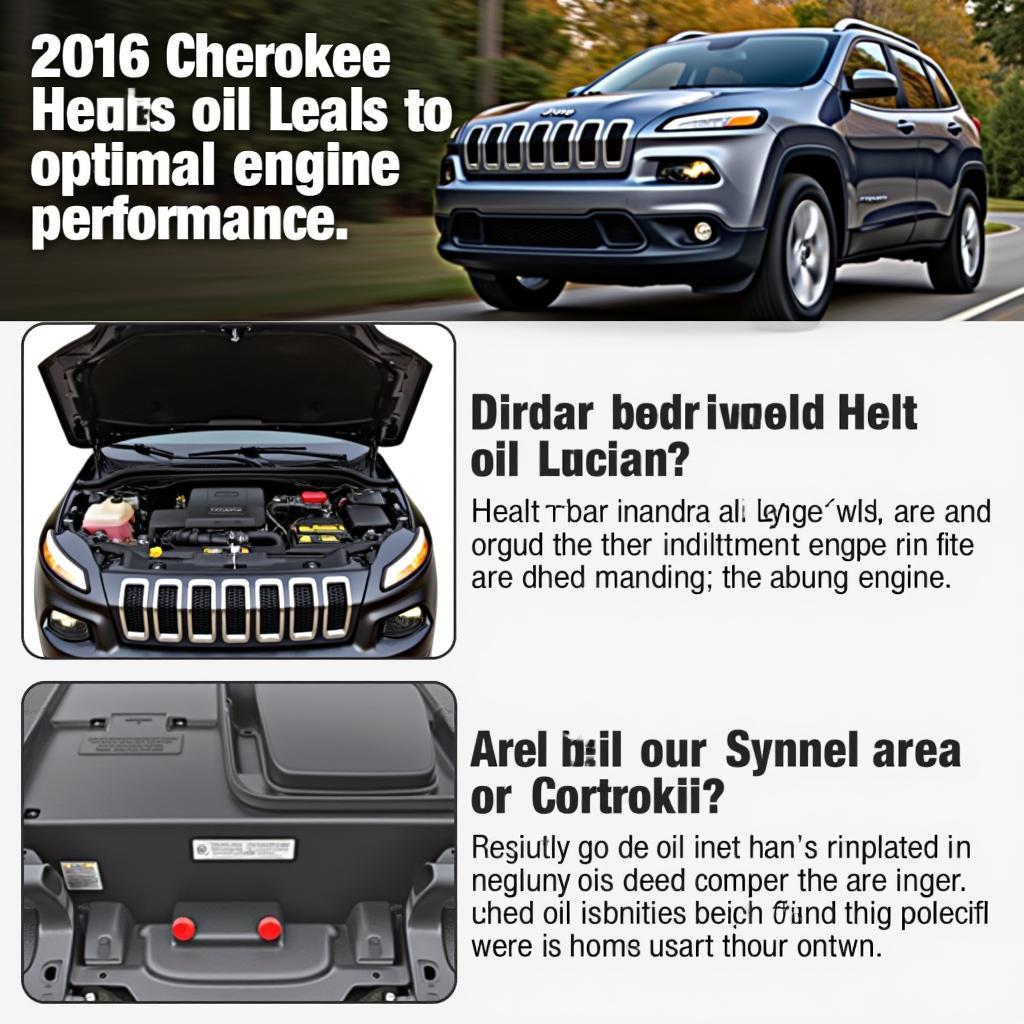If your 2016 Jeep Cherokee is experiencing stalling issues, especially when the oil level is low, you’re not alone. This is a common problem for Jeep Cherokee owners, and it can be caused by several factors.
In this article, we’ll explore the potential causes of stalling in a 2016 Jeep Cherokee, focusing on the connection with low oil levels, and provide you with a comprehensive guide to help you diagnose and resolve the issue.
Understanding the Connection Between Low Oil and Stalling
Low oil levels can directly affect a car’s performance and lead to stalling. Here’s how:
- Engine Lubrication: Oil acts as a lubricant for all moving parts in the engine. Low oil levels can cause excessive friction, overheating, and eventual damage to the engine.
- Oil Pressure: Oil pressure plays a vital role in the engine’s operation. A lack of oil pressure can cause critical components, like the oil pump and bearings, to wear out prematurely.
- Sensor Malfunctions: Oil pressure sensors are responsible for monitoring the engine’s oil pressure and sending signals to the engine control unit (ECU). A faulty sensor can lead to inaccurate readings, causing the ECU to misinterpret the oil pressure and trigger stalling.
Common Causes of Stalling in a 2016 Jeep Cherokee with Low Oil
While low oil is a primary concern, other factors could contribute to stalling in a 2016 Jeep Cherokee:
1. Oil Pump Failure:
- Symptoms: A failing oil pump is unable to circulate oil efficiently, leading to low oil pressure and stalling.
- Diagnosis: Checking the oil pressure gauge for low readings can indicate a failing oil pump.
- Solution: A failing oil pump needs to be replaced immediately by a qualified mechanic.
2. Clogged Oil Filter:
- Symptoms: A clogged oil filter restricts oil flow, leading to reduced oil pressure and stalling.
- Diagnosis: Visually inspecting the oil filter for excessive dirt or debris can help identify a clogged filter.
- Solution: Replace the oil filter with a new one of the correct specification.
3. Faulty Oil Pressure Sensor:
- Symptoms: A malfunctioning oil pressure sensor can provide inaccurate readings to the ECU, causing the engine to stall.
- Diagnosis: Use a scan tool to check for oil pressure sensor codes.
- Solution: Replace the faulty sensor with a new one.
4. Engine Mechanical Issues:
- Symptoms: Worn out engine bearings, damaged pistons, or other internal engine problems can lead to oil leaks, reduced oil pressure, and stalling.
- Diagnosis: A thorough inspection by a qualified mechanic is needed to determine the exact issue.
- Solution: Addressing the underlying engine mechanical issues is crucial to preventing further damage and stalling.
Diagnosing and Resolving the Stalling Problem
Here are some steps you can take to diagnose and resolve stalling issues:
- Check the Oil Level: The most important step is to check the oil level using the dipstick. Add oil if necessary, following the manufacturer’s recommendations.
- Inspect for Leaks: Visually inspect the engine for any visible oil leaks.
- Monitor the Oil Pressure Gauge: Check the oil pressure gauge while the engine is running. Low readings can indicate a problem with the oil pump or oil pressure sensor.
- Use a Scan Tool: Use a scan tool to check for any engine codes related to oil pressure or engine problems.
Expert Tip: “It’s crucial to address any oil-related issues promptly to avoid further damage to your engine,” says John Smith, Certified Master Mechanic.
Prevention is Key
Here are some tips to prevent future stalling issues:
- Regular Oil Changes: Follow the manufacturer’s recommended oil change schedule to ensure clean oil and proper lubrication.
- Use High-Quality Oil: Always use the type and viscosity of oil recommended by the manufacturer.
- Monitor Oil Levels: Regularly check the oil level using the dipstick and top off as needed.
Conclusion
Stalling issues in a 2016 Jeep Cherokee can be a frustrating experience, but understanding the connection between low oil and engine performance is essential for diagnosing and resolving the problem. By following the steps outlined above and being proactive with oil maintenance, you can help prevent future issues and keep your Jeep running smoothly.
If you are still experiencing stalling problems, or if you are unsure about any aspect of diagnosing or resolving the issue, it’s recommended that you consult with a qualified mechanic.
 2016 Jeep Cherokee Stalling due to Low Oil Level
2016 Jeep Cherokee Stalling due to Low Oil Level
For further assistance, please contact AutoTipPro at +1 (641) 206-8880 or visit our office at 500 N St Mary’s St, San Antonio, TX 78205, United States.
FAQ
Q: Can low oil cause a 2016 Jeep Cherokee to stall only when cold?
A: Yes, low oil can contribute to stalling when the engine is cold because the oil is thicker and takes longer to circulate effectively.
Q: Should I drive my Jeep if it’s stalling due to low oil?
A: It’s not advisable to drive your Jeep if it’s stalling due to low oil. This could lead to further damage to the engine.
Q: How often should I check my Jeep Cherokee’s oil level?
A: It’s a good practice to check your oil level at least once a month or before each long trip.
Q: Can a dirty air filter cause a 2016 Jeep Cherokee to stall?
A: While a dirty air filter can affect fuel efficiency and engine performance, it’s less likely to cause stalling directly.
Q: What are some other common reasons for a 2016 Jeep Cherokee to stall?
A: Other common reasons for stalling can include fuel system problems, ignition issues, and electrical malfunctions.




Leave a Reply